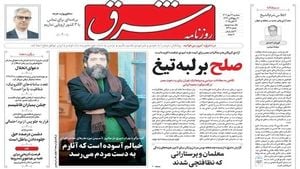New Delhi faces harsh criticism from Amnesty International as allegations of serious human rights violations mount against its government, particularly concerning the situation in Jammu and Kashmir. The recent report, released this week, casts a glaring spotlight on the Indian government's record, which Amnesty describes as troubling and inadequate when it pertains to civil liberties and the protection of fundamental rights.
The report, titled Why should India’s human rights record matter in its bid for a permanent seat on the UN Security Council?, delves deeply not just the conditions within Jammu and Kashmir but also examines India's broader human rights practices. According to Kashmir Media Service, Amnesty states, “The situation in [occupied] Jammu and Kashmir remains particularly concerning, with reports from the Office of the High Commissioner for Human Rights (OHCHR) urging India to honor its international obligations. Instead of addressing these findings, Indian authorities have dismissed them as false narratives.”
Over the course of the past few years, particularly since the revocation of Article 370 on August 5, 2019, which once granted Jammu and Kashmir considerable autonomy, the region has seen increased militarization and oppression. Amnesty International explicitly highlights how this move signifies not just administrative changes but rather the stripping away of the rights and freedoms of the local population. With the hands of law enforcement allegedly being tied under draconian laws like the Armed Forces (Jammu and Kashmir) Special Powers Act, the Indian government has been accused of granting security forces sweeping impunity.
Instead of engaging with legitimate human rights critiques, the Indian government has countered by labeling international reports, including those from the OHCHR, as politically motivated attacks. Reports from 2018 and 2019 have urged the repeal of various repressive laws and have called for measures to safeguard journalists and civil society. Yet, Amnesty charges, “India has chosen to respond vehemently rather than embrace the constructive criticism aimed at bolstering human rights implementation.”
This persistent refusal to acknowledge international human rights obligations raises red flags as India seeks to bolster its claim for a permanent UNSC seat. The report notes how India’s status within various UN bodies has been hamstrung by its performance on human rights, leading observers to question the sincerity of its ambition on the global stage.
UN experts have issued around 25 statements voicing concerns over India’s practices since 2019, reflecting the growing unease with its human rights record. Key figures within the UN, like Michelle Bachelet, have underscored the need for member nations to actively promote human rights as part of their responsibilities, directly implicatively clouding India’s bid.
Dr. Ghulam Nabi Fai, Chairman of the World Forum for Peace and Justice, remarked on the need for the international community to heed these warnings. His commentary follows the Amnesty report’s publication, asserting the document's significance for heightened global awareness about India's considerable breaches of international standards.
India’s participation, or lack thereof, within human rights treaties is also noted. Despite ratifying six of nine core treaties, the country has consistently faltered on recommendations provided by mechanisms such as the Universal Periodic Review (UPR). It becomes apparent from Amnesty’s findings and Dr. Fai's insights, the repeated failures to implement suggestions indicate either reluctance or an inability to engage constructively on human rights.
Further complicity is brought to light with the inadequate responses by Indian authorities to communications from UN Special Procedures. To date, less than one-third of over 200 inquiries have received any meaningful response since 2011, and just two visits from UN experts have been authorized since the ruling Bharatiya Janata Party took power, leaving many requests hanging without resolution.
The issue of human rights violations is not merely theoretical for the inhabitants of Jammu and Kashmir, as the Amnesty report lays out. With explicit accounts of violence reported—highlighted by instances where Indian troops have allegedly taken lives of innocent civilians—the urgency to address these allegations grows. Casualties have become emblematic of the strife felt by the local populace, culminating, as Amnesty suggests, from policies seen as intellectual and societal suffocation.
This complex situation is compounded by statements from UN experts who express fears of demographic shifts resulting from recent administrative changes. Such changes, they warn, could erode the fabric of minority rights within Jammu and Kashmir, raising alarming questions about the potential for ethnic and religious changes resulting from state policy.
Dr. Gregory Stanton from Genocide Watch has gone as far as to claim, “Kashmir is at the brink of genocide,” following the stringent measures enforced upon its population. This alarming claim, along with reports from major news outlets like The New York Times and Huffington Post, reflects severe apprehension over the diminishing prospects for peace and justice.
Calls for action from various speakers during seminars, including those urging the United Nations to uphold its resolutions concerning Kashmir, echo the sentiment of the Amnesty report. The overarching theme stresses the necessity for accountability and the cessation of human rights violations as pivotal elements required for any hope of lasting peace within the region.
The Amnesty report succinctly encapsulates the dire need for India to reform its human rights standards as part of its campaign to secure greater international standing. Without stringent adherence to human rights obligations, India’s appeal for elevated status within global governance structures such as the UNSC rings hollow. There exists now, more than ever, a pressing responsibility on India’s part to demonstrate commitment to human rights, not only to improve internal conditions but also to validate its international aspirations.



